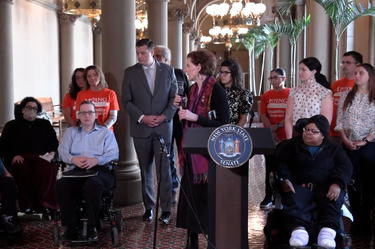Bill would allow for quicker repair of wheelchairs — ‘a tool of freedom and independence’
— Still frame from NYS Senate video of Feb. 19 press conference
“This is the face of diversity right here,” says Senator Patricia Fahy, at the lectern, promoting the Consumer Wheelchair Repair Bill of Rights. Speakers at the press conference seated in front are, from left: Erica Molina, Alex Thompson, and Shameka Andrews.
Shameka Andrews was Christmas shopping in November at Colonie Center when her wheelchair abruptly stopped.
“I think your motor blew,” said a man in the food court who tried to help.
Andrews had no backup chair although she had ordered one in May.
Her broken wheelchair sat at the mall for two weeks before the vendor could pick it up.
“There is no triple-A for wheelchairs,” said Andrews.
She didn’t get her repaired chair back until early February and it is still not working right, she said.
Andrews, the founder of Disability Empower Consulting, matter-of-factly told her story at a press conference on Feb. 19 hosted by Senator Patricia Fahy who chairs the Senate’s Disabilities Committee.
Fahy, a Democrat, represents most of Albany County, part of Schenectady County, and all of Montgomery County.
Andrews’s story of being isolated in her home for two months highlighted the need for a bill Fahy is sponsoring, Consumer Wheelchair Repair Bill of Rights Act (S.4500), which Fahy likened to the right-to-repair bill she shepherded through in 2022 as an assemblywoman.
This bill, which Fahy hopes to pass this year, focuses entirely on wheelchair repair.
The bill’s stated purpose is “To require a manufacturer to provide parts, embedded software, firmware, tools, or documentation, such as diagnostic, maintenance, or repair manuals, diagrams, or similar information, to independent repair providers and owners of the manufacturer’s powered wheelchairs to allow an independent repair provider or owner to conduct diagnostic, maintenance, or repair services on the owner's powered wheelchair.”
Fahy cited a 2022 survey by the United States Public Interest Research Group that shows Andrews was not alone in her long wait for repairs: 62 percent of wheelchair users waited four or more weeks for repairs, and 40 percent waited seven or more weeks.
The U.S. PIRG survey also found how frequently repairs are needed: 93 percent needed at least one repair in the past year, with 77 percent requiring two or more repairs.
Assemblywoman Gabriella Romero, a Democrat representing New Scotland and parts of Albany and Guilderland, said the statistics cited by Fahy “should be unacceptable to everyone.”
Russ Haven of NYPIRG said that, nationwide, 5.5 million people use wheelchairs, with 300,000 wheelchair users in New York state.
Each chair, he said, costs tens of thousands of dollars.
Haven said of the long time it takes for repairs, “It’s ridiculous; it’s cruel; it’s unfair.”
Fahy spoke of the “monopoly” held by a few manufacturers, leading to high costs and long waits for repairs.
The bill, she said, is modeled on one Colorado passed in 2022. It is co-sponsored by Jacob Ashby, a Republican who represents all of Rensselaer County and parts of Washington and Albany counties.
“Consider the autonomy,” said Ashby, who has worked as an occupational therapist for 20 years.
Someone who uses a wheelchair, he stressed, cannot get out of bed in the morning, or fix a meal to eat, or go to work if their wheelchair is broken.
Others at the press conference spoke from their wheelchairs of their necessity.
Erica Molina, a lawyer who works as the program director at Disability Rights New York, said, “I’m no stranger to barriers."
She did not get a power wheelchair until she was 23, in 2010, because her parents’ insurance would not cover the expense, she said. Her father would do repairs on the manual chair she used.
“The current restrictions undermine the civil rights of wheelchair users,” said Molina, noting low-income and rural residents are disproportionately affected.
She said just two vendors are approved under Medicaid statewide, calling it a “vendor monopoly.”
“Vendors profit at the expense of our clients’ health and safety,” said Molina.
Alex Thompson, a lawyer who works as the director of advocacy at the New York Association on Independent Living, described a wheelchair, which he started using after a spinal-chord injury, as “a tool of freedom and independence.”
Thompson said, “It’s a devastating thing when your wheelchair breaks down.”
He said, “I will try to fix my chair if something goes wrong" but he needs access to parts and manuals. If he had that access, and could make a quick repair, Thompson said, “I don’t have to cancel everything on my calendar for a month.”
Julia Duff, who directs the Spina Bifida Association of New York State, explained that spina bifida is a birth defect that can cause paralysis. Some people with spina bifida, she said, start using wheelchairs as children while others use them just for long distance or as they age.
“These devices open doors to opportunities,” said Duff, noting it is a “very complex” process to receive a chair. Many times, she said, insurance companies have “deemed them not medically necessary.”
Wheelchairs can be essential, Duff said, for managing everything from hygiene to education and work, and their availability keeps people from being “mistreated, isolated, and excluded in society.”
Elizabeth Martin, the chief executive officer of Living Resources of New York, which serves 1,800 people with disabilities, said that people who use wheelchairs are “limited and harmed” by slow repairs.
“It’s disgusting it’s allowed to happen,” she said.
Loaner chairs, Martin said, are not specifically fitted to a person’s body and cause pain and limit their ability to function.
She said that passage of the bill would help people using wheelchairs become closer to being “equally valued citizens … because right now, they’re not.”
Fahy referenced DEI being “really in the news the last couple of days,” and said, gesturing to the speakers seated in wheelchairs before her, “This is the face of diversity right here.”
She said of her bill, “And this is about inclusion for those who want to work, want to participate, want to advocate, want fuller lives. So thank you for being the face of this legislation … This is what diversity means.”



